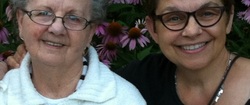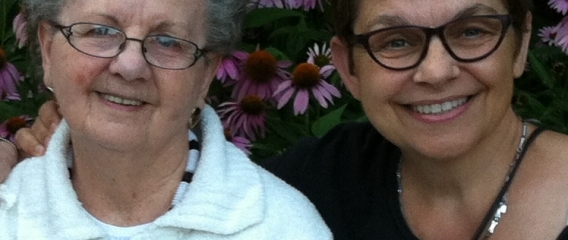My mother began experiencing mini-strokes about 15 years ago. She’s now 87 and has had full-blown dementia for at least five years. Before mom became incapable, she named me as her attorney for personal care (or substitute decision maker). This means I have a decision-making veto in the event that she is unable to make her own health care decisions. This is clearly the case now.

I listened to this radio clip with a chill running up my spine. How awful for this woman’s family. How tragic that the woman’s own stated intentions are not being honored.
My mom still recognizes me most of the time. Her quality of life is pretty good, under the circumstances. She has a loving husband, Bob ( my stepfather whom I consider a great friend), looking out for her, and a loving caregiver who comes to the house five days a week (soon to be extended to seven).
I just placed a call to mom’s doctor, asking her to call me back to discuss a ‘Do Not Resuscitate’ order for mom. I know that mom’s wish would be to let her pass on, should she suffer from a heart attack. When I told mom’s private nurse about this decision she blanched and said, “That is against everything I’ve been trained to do as a nurse.” We’re not at the point of removing food but I believe I would do the same as the daughter mentioned above if my mom were at that stage in the disease process.

Shinzen teaches the importance of equanimity (acceptance of ‘what is’). I’m looking for a balance between accepting ‘what is’ and working toward goals. (Having a goal is, by definition, a desire for something other than what is happening right now (even if the goal is simply to achieve greater equanimity). One of my goals is to be cognitively capable for the rest of my life and to do what I can to facilitate that. But I also know that I don’t actually have control: anything can happen and it’s wise to strengthen my capacity for equanimity. That is where mind training comes in. For me, that consists of practicing mindfulness meditation (http://www.betterbrainbetterlife.com/brain-builders/books) in addition to brain entrainment, mostly in the alpha ranges.
Researchers from Deakin University in Australia (http://www.eurekalert.org/pub_releases/2013-07/s-aps071113.php) recently published a study on happiness and control in seniors. They compared a group of 101 seniors living independently in the community, with another group of 101 seniors living in care facilities. They state: “When it comes to satisfaction in later life the ability to accept what cannot be changed is as important as the feeling of being able to exert control.”
Interestingly, it appears that my mind-training program helps me both to strengthen my equanimity and achieve my goals. Mindfulness meditation grows grey matter in the brain and trains me to notice, appreciate and accept ‘what is’; the brain entrainment device keeps me cognitively sharp, thus increasing my ability to achieve my goals. I find that both of these endeavors also help to dissolve my fear (although it is not entirely gone…..dare I say, ‘yet’).
As for my mom….she has much more equanimity that she did in the past, which is not always the case for those with dementia. She was silent throughout a recent dinner party at her house, but near the end she looked up from her food and began reaching for words. “This is so nice,” she said gesturing with her arms….and clearly searching her mind… to express what she was feeling. “We’re all..(long pause)…one.”
Who knows what brief shining moments of clarity mom might be experiencing? She certainly articulated a profound insight in that moment. How is she doing with her loss of control? Just fine, it seems. How am I doing with knowing that down the road I may have to help decide that it is time for her to die? Right now I feel good about it. I am confident that I can make decisions in accord with mom’s wishes and I consider it an honor to hold her trust. But will those in authority allow me to make the decisions mom would want me to make? Who will be in control?

